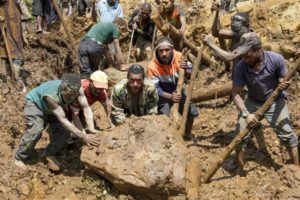Around 2,000 feared dead in Papua New Guinea landslide
Bangkok: The Papua New Guinea government said more than 2,000 people are believed to have been buried alive in a landslide in the South Pacific island nation, after the side of a mountain came down in the early hours of Friday morning when the village of Yambali was asleep.
The settlement is located in a restive and remote area in the interior of the poor, rural nation off the northern coast of Australia, making search and rescue efforts complicated and hazardous.
The government death toll is roughly triple the UN estimate of 670 killed. The remains of only six people had been recovered so far.
In a letter seen by The Associated Press to the United Nations resident coordinator dated Sunday, the acting director of Papua New Guinea’s National Disaster Center Luseta Laso Mana said the landslide “buried more than 2,000 people alive” and caused “major destruction” at Yambali village in the Enga province.
Estimates of the casualties have varied widely since the disaster occurred, and it was not immediately clear how officials arrived the number of people affected.
Here’s a look at some of the challenges: The village of at least 4,000, but believed to be substantially larger, is in a mountainous and forested part of Papua New Guinea’s Enga province. It’s located alongside a winding highway to the town of Porgera and a mine that has produced billions of dollars of gold but whose security personnel have been accused by rights groups of abuses.
The highway was covered by the landslide, effectively cutting off Porgera and the other villages past Yambali from the provincial capital of Wabag, some 60 kilometres from where the disaster occurred.
Emergency responders have brought aid in from Wabag, but have had to make the final 200 metres of the journey by foot over the rubble-covered highway.
Debris 6 to 8 metres deep covering an area the size of three or four football fields was being cleared exclusively by hand with shovels and picks for more than two days, until an excavator donated by a local builder arrived on Sunday.
Survivors have been hesitant to allow heavy machinery to be used, however, because they do not want the bodies of their relatives harmed, said Serhan Aktoprak, the chief of the UN migration agency’s mission in Papua New Guinea. The donated excavator was driven away Monday morning, though it’s not clear whether that was related to locals’ objections or for another reason, he said.
Comments




 Driving Naari Programme launched in Chandigarh
Driving Naari Programme launched in Chandigarh Punjab farmers reaping benefits of Mann Government’s crop diversification initiatives
Punjab farmers reaping benefits of Mann Government’s crop diversification initiatives Punjab and Kerala Join Hands to Address NRI Concerns
Punjab and Kerala Join Hands to Address NRI Concerns Macron refuses French Prime Minister’s resignation after chaotic election results
Macron refuses French Prime Minister’s resignation after chaotic election results Modi lands in Russia for first visit since Ukraine offensive
Modi lands in Russia for first visit since Ukraine offensive Saudi Arabia approves granting citizenship to global experts under Vision 2030
Saudi Arabia approves granting citizenship to global experts under Vision 2030 Vigilance arrests Panchayat Secretary, former Sarpanch for embezzlement in Panchayat funds
Vigilance arrests Panchayat Secretary, former Sarpanch for embezzlement in Panchayat funds Housing crisis in Canada forcing residents to move out of pricier cities: Poll
Housing crisis in Canada forcing residents to move out of pricier cities: Poll Historic Milestone: Canada Appoints Its First Female Chief of Defense
Historic Milestone: Canada Appoints Its First Female Chief of Defense Victory parade of T20 World Cup-winning Indian cricket team concludes in Mumbai
Victory parade of T20 World Cup-winning Indian cricket team concludes in Mumbai Maximizing impact of Aadhar in Punjab
Maximizing impact of Aadhar in Punjab Amritpal Singh to take oath as Khadoor Sahib MP on July 5
Amritpal Singh to take oath as Khadoor Sahib MP on July 5 Driving Naari Programme launched in Chandigarh
Driving Naari Programme launched in Chandigarh Punjab farmers reaping benefits of Mann Government’s crop diversification initiatives
Punjab farmers reaping benefits of Mann Government’s crop diversification initiatives Punjab and Kerala Join Hands to Address NRI Concerns
Punjab and Kerala Join Hands to Address NRI Concerns Macron refuses French Prime Minister’s resignation after chaotic election results
Macron refuses French Prime Minister’s resignation after chaotic election results Modi lands in Russia for first visit since Ukraine offensive
Modi lands in Russia for first visit since Ukraine offensive Saudi Arabia approves granting citizenship to global experts under Vision 2030
Saudi Arabia approves granting citizenship to global experts under Vision 2030 Vigilance arrests Panchayat Secretary, former Sarpanch for embezzlement in Panchayat funds
Vigilance arrests Panchayat Secretary, former Sarpanch for embezzlement in Panchayat funds Housing crisis in Canada forcing residents to move out of pricier cities: Poll
Housing crisis in Canada forcing residents to move out of pricier cities: Poll Historic Milestone: Canada Appoints Its First Female Chief of Defense
Historic Milestone: Canada Appoints Its First Female Chief of Defense Victory parade of T20 World Cup-winning Indian cricket team concludes in Mumbai
Victory parade of T20 World Cup-winning Indian cricket team concludes in Mumbai Maximizing impact of Aadhar in Punjab
Maximizing impact of Aadhar in Punjab Amritpal Singh to take oath as Khadoor Sahib MP on July 5
Amritpal Singh to take oath as Khadoor Sahib MP on July 5